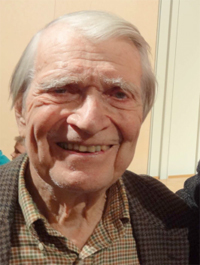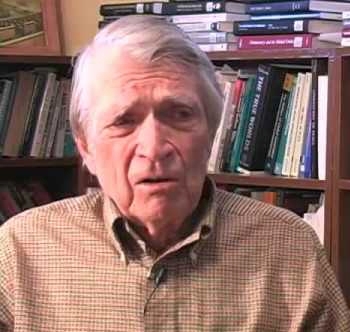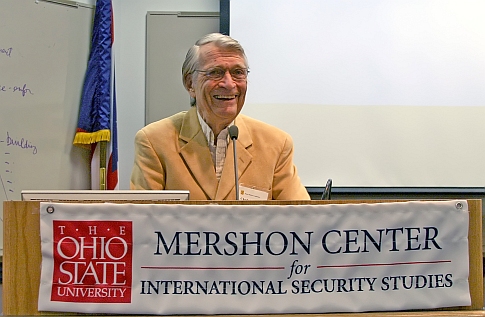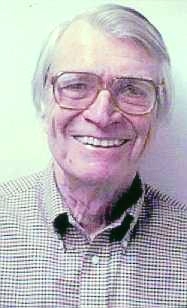Chadwick Fairfax Alger
1924-2014
Vice President of the IPRA Foundation Board of Directors from 2008-2014

Born in Chambersburg, PA, October 9, 1924, died February 15, 2014 in Columbus, OH. Volunteered and served from 1943-46 in US Navy as a PBM Mariner patrol bomber radioman in the Pacific. Attended Ursinus College, Collegeville, NJ 1946-49 where he met Elinor Reynolds, marrying in 1948. Military service generated an interest in international relations and he continued his education with an MA from Johns Hopkins in 1950. After four years with the Navy as an intelligence analyst, returned to academia at Princeton, earning a PhD in 1957. Professor of political science at Northwestern University from 1958-71, distinguishing himself with study of the UN system and peace research. Alger joined the faculty of Ohio State University in 1971 as Mershon Professor of Political Science and Public Policy, continuing to teach and write for over 40 years. In addition to numerous books and over 100 articles on the UN System, peace building, and conflict resolution, he is a past president of the International Studies Association among many other organizational affiliations. He enjoyed Columbus culture, and cherished weekends with his wife of 64 years at their farm in Gratiot, Ohio. In recent years he has enjoyed reunions with members of his PBM Squadron. Survived by children, Mark (Rebecca), Scott, Laura (Rich) Carter and Craig; and grandchildren, Ryan Alger and Chad, Ross and Sam Carter.
Published in The Columbus Dispatch from Feb. 20 to Feb. 21, 2014
*****
President of the International Studies Association (ISA) (1978-1979)
Secretary General International Peace Research Association (1983-87)
Vice President International Peace Research Association Foundation (1998-2014)
Mershon Professor of Political Science and Public Policy Emeritus
Ohio State University, Mershon Center, Columbus, Ohio, U.S.A.
Chadwick Alger Prize (awarded annually) – International Studies Association (ISA)
Education
B.A., Political Science, Ursinus College (1949)
M.A., School of Advanced International Studies, Johns Hopkins University (1950)
Ph.D., Political Science, Princeton University (1957)
Teaching/Research
Professor Alger’s research and teaching interests were centered on:
- Global problem-solving by international governmental and non-governmental organizations, primarily focused on the United Nations System.
- The world relations of local people, governments and organizations.
- Inventory and evaluation of available “tools” and strategies for peace building.
Subjects of his research have included decision-making in the U.N. General Assembly, the role of non-governmental organizations in the struggle for human rights and economic well-being, evolving roles of NGOs in U.N. decision-making, potential roles of the U.N. System in the 21st century, religion as a peace tool, the expanding tool chest for peace builders, and why the United States needs the U.N. System.
Professor Alger was Director of the Mershon Program in Transnational Intellectual Cooperation in the Policy Sciences (1971-81) and Director of the Mershon Program in World Relations (1982-91)
One of the “Parents of the Field” of Conflict and Peace Research
Wonderful Chad Alger article and video from the George Mason School for Conflict Analysis and Resolution website
Selected Publications
Pioneer in the Study of the Political Process and on NGO Participation in the United Nations, (Springer Briefs, 2014)
The UN System and Cities in Global Governance, (Springer Briefs, 2014)
Peace Research and Peacebuilding, (Springer Briefs, 2014)
Simulation In International Relations: Developments for Research and Teaching, by Harold Steere Guetzkow (Editor), Chadwick F. Alger and Richard A. Brody Contributors, (2012)
“The Escalating Peacebuilding Potential of Global Governance,” in Building Sustainable Futures: Enacting Peace and Development, ed. by Luc Reychler, Kevin Villanueva, and Julianne Funk Deckard (University of Deusto, 2009)
“Changes in Peace Research, 1960-2008,” in International Encyclopedia of Peace, ed. by Nigel Young (Oxford University Press, 2009)
“There are Peacebuilding Tasks for Everybody” (International Studies Review, 2007)
“Peace Studies as a Transdisciplinary Project,” in Handbook of Peace and Conflict Studies, ed. by Johan Galtung and Charles Webel (Routledge, 2007)
“Widening Participation,” in The Oxford Handbook on the United Nations, by Thomas G. Weiss and Sam Daws (Oxford University Press, 2007)
The United Nations System: A Reference Manual (ABC-CLIO, 2006)
“Expanding Involvement of NGOs in Emerging Global Governance,” in Subcontracting Peace: The Challenges of NGO Peacebuilding, by Oliver P. Richmond and Henry F. Carey (Ashgate, 2005)
“Quali sono le implicazioni, sia a livello regionale che globale, del coinvolagimento delgi attori localia nell’ambiato della governance futura?” [“What are the Implications of the Regional and Global Activities of Local Authorities for Future Global Governance?”] (Futuribili, special issue on “Urban Systems and the Future,” 2004)
“Searching for Democratic Potential in Emerging Global Governance,” in Transnational Democracy in Critical and Comparative Perspective, ed. by Bruce Morrison (Ashgate, 2003)
“Evolving Roles of NGOs in Member State Decision-Making in the UN System” (Human Rights Review, 2003)
The Future of the United Nations System: Potential for the Twenty-First Century, ed. for the International Peace Research Association (United Nations University Press, 1998)
The United Nations and Policies of Member States, co-ed. with Gene Lyons and John Trent (United Nations University Press, 1995)
Peacemaking in the Post Cold War Era (Tamkang University, 1993)
A Just Peace Through Transformation: Cultural, Economic and Political Foundations for Change, co-ed. with Michael Stohl (Westview Press, 1988)
Internationalization from Local Areas: Beyond Inter-State Relations (Nippon Hyoron Sha, 1987) (in Japanese)
Conflict and Crisis of International Order: New Tasks for Peace Research, co-ed. with Judit Balazs (Hungarian Academy of Science, 1985)
You and Your Community in the World, co-authored with David G. Hoovler, (Columbus, OH: The Ohio State University, Consortium for International Studies Education, 1978)
United States Representation in the United Nations, (New York: Carnegie Endowment for International Peace, 1961)
The Use of Private Experts in the Conduct of US Foreign Affairs, Ph.D. Dissertation, Princeton Univ., 1957)
More than 100 articles in journals such as Administrative Science Quarterly, American Political Science Review, International Organization, International Social Science Journal, International Studies Quarterly, Journal of Peace Research, Public Opinion, and World Politics.
Honors, Awards and Service
Founder of Peace Research Award, 22nd Global Conference of the International Peace Research Association (2008)
Chadwick F. Alger Prize for Best Graduate Student Essay on Civil Society established by International Organization Section, International Studies Association (1997)
International Outstanding Faculty Award, The Ohio State University (1993)
Phi Beta Delta Outstanding Faculty Award, The Ohio State University (1992)
Executive Committee, International Peace Research Association (1971-77); Secretary General (1983-87); Vice President International Peace Research Association Foundation (1998-)
Distinguished Scholar Award, International Society for Educational, Cultural and Scientific Interchanges (1980)
LLD, Ursinus College (1979)
Consortium on Peace Research, Education, and Development, Executive Committee (1970-73 and 1980-83), Chairperson (1974-75)
American Political Science Association, Member of Council (1970-72)
International Studies Association, Program Chairman (1968, 1972), President (1978-79)
Mid-West Political Science Association Prize (1965)
Employment (non-academic)
United States Navy, Aviation Radioman, Second Class Petty Officer, Pacific Service (1943-46)
Department of Navy, Pentagon, Naval Intelligence Analyst (1950-54)
Mershon Projects
The United Nations System, with particular interest in providing an overview of its emerging roles in long-term peace building and the growing participation of civil society (including non-governmental organizations), local governments and business.
Peace Studies as a Transdisciplinary Project, an effort to provide a comprehensive overview of growing knowledge about strategies for preventing violence, for post-violence peace building, and for long-term peace building. One goal of the project is to illuminate the fact that “there are peace tasks for everybody.”



